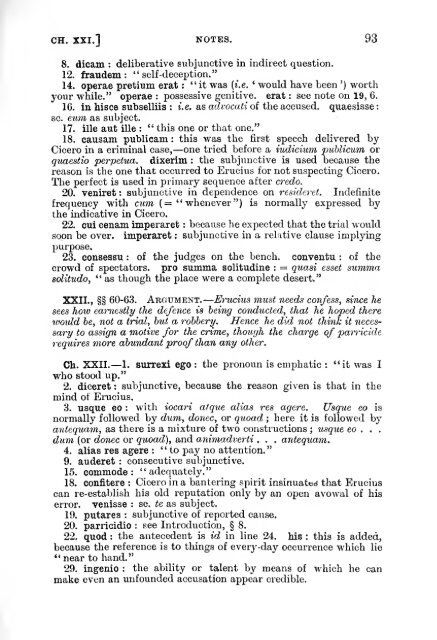Pro S. Roscio Amerino
Pro S. Roscio Amerino
Pro S. Roscio Amerino
You also want an ePaper? Increase the reach of your titles
YUMPU automatically turns print PDFs into web optimized ePapers that Google loves.
CH. XXI.] NOTES. 93<br />
8. dicam : deliberative subjunctive in indirect question.<br />
12. fraudem " : self-deception."<br />
14. operae pretium erat " : it was (i.e. ' would have been ') wortli<br />
your while." operae : possessive genitive. erat : see note on 19, 6.<br />
16. in hisce subselliis : i.e. as advocati of the accused. quaesisse<br />
se. eam as subject.<br />
17. ille aut ille " : this one or that one."<br />
18. causam publicam : this was the first speech delivered by<br />
Cicero in a criminal case,—one tried before a iudicium piiblicum or<br />
qtiaestio perpetua. dixerim : tlie subjunctive is used because the<br />
reason is the one that occurred to Erucius for not suspecting Cicero.<br />
The perfect is used in primary sequence after credo.<br />
20. veniret : subjunctive in dependence on resideret. Indefinite<br />
frequency with ciim (= " whenever ") is normally expressed by<br />
the indicative in Cicero.<br />
22. cui cenam imperaret : because he expected that the trial would<br />
soon be over.<br />
purpose.<br />
imperaret : subjunctive in a relative clause implying<br />
23. consessu : of the judges on the bench. conventu : of the<br />
crowd of spectators. pro summa solitudine : = quasi esset summa<br />
solitudo, " as though the place were a complete desert."<br />
XXII., §§ 60-63. Abgument.—Erucius must needs con/ess, since he<br />
sees how eaimestly the defence is being conducted, that he hoped there<br />
would be, not a trial, but a robhery. Hence he did not think it necessary<br />
to assign a motive for the crime, though the charge of pa7-7-icide<br />
requires more abundant proof than any other.<br />
Ch. XXII.— 1. surrexi ego : the pronoun is emphatic : "it was I<br />
who stood up."<br />
2. diceret : subjunctive, because the reason given is that in the<br />
mind of Erucius.<br />
iocari atque alias res agere. Usque eo is<br />
3. usque eo : with<br />
normally followed by dum, donec, or quoad ; here it is followed by<br />
antequam, as there is a mixture of two constructions ; u^que eo . . .<br />
dum (or donec or quoad), and animadverti . . , antequam.<br />
4. alias res agere " : to pay no attention."<br />
9. auderet : eonsecutive subjunctive.<br />
15. commode " : adequately."<br />
18. confitere : Cicero in a bantering spirit insinuatcd that Erucius<br />
can re-establish his old reputation only by an open avowal of his<br />
error. venisse : sc. te as subject.<br />
19. putares : subjunctive of reported cause.<br />
20. parricidio : see Introduction, § 8.<br />
22. quod : the antecedent is id in line 24. his : this is added,<br />
because the reference is to things of every-day occurrence which lie<br />
"near to hand."<br />
29. ingenio : the ability or talent by means of which he cau<br />
make even an unfounded accusation appear credible.<br />
:

















